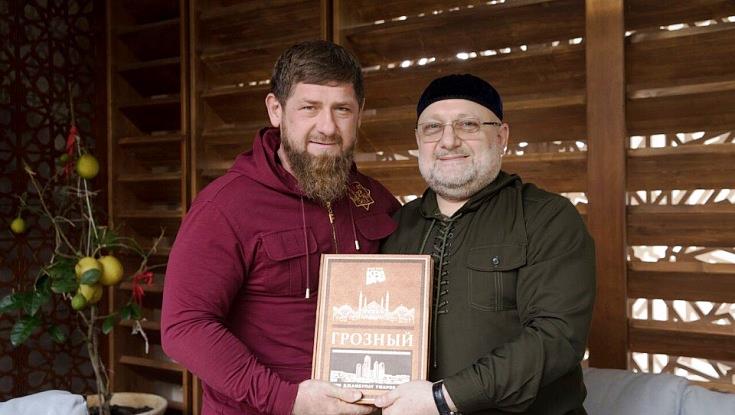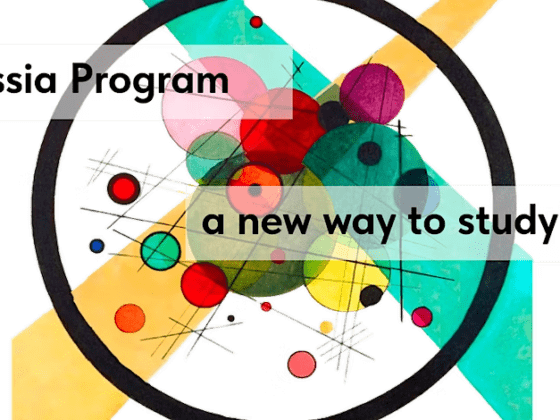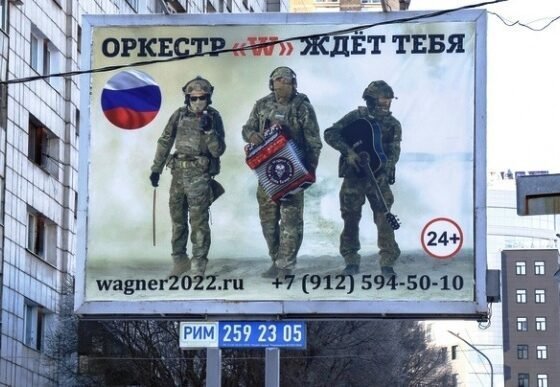A year after the beginning of the Russian invasion of Ukraine, the challenges faced by the Russian army in Ukraine opened the door for internal turmoil among its actors and within Russian power ministries involved in the war. Some regional leaders like Ramzan Kadyrov and independent players like Yevgeny Prigozhin have been taking advantage of the war to promote their persona and capabilities across Russian nationalist circles. Their main objective is to rise within Russia’s power vertical by contending and competing with power ministries at the federal level—and with the Russian army in Ukraine. The case of Kadyrov is intriguing as his bid for federal politics comes at the cost of risking his own survival in his southern fiefdom.
The Chechen leader and his forces are embroiled in a paradoxical situation in which their political influence has been growing rapidly at the federal level, while the stability of Chechnya is being threatened by their military struggle in Ukraine, the political mobilization against the war, the decolonization discourse, and the renewal of the North Caucasus insurgency. This memo tracks the rise of Kadyrov in the federal political system to his recent clashes with the Ministry of Defense (MoD) to understand how the war in Ukraine is transforming his relationship with President Vladimir Putin and his control over Chechnya and the North Caucasus. His latest maneuverings tie him ever closer to Putin, expose him to intrigues by other powerful Russian figures, and reduce Chechen nationalism.
Tensions Between Kadyrov and the Defense Ministry
Throughout the last part of 2022, Kadyrov and other Russian federal political actors launched a frontal attack against the MoD and several high-ranking military officers. Kadyrov’s feud ignited in May 2022 when he was forced by the MoD to create four Chechen battalions to serve in the Russian army. After that, Kadyrov published many statements on his Telegram account challenging decisions made by high-ranking officers. In September 2022, Kadyrov voiced his dissatisfaction with the exchange of prisoners of war with Ukraine involving fighters of the “Azov” regiment. Following the debacle of the Russian army in Kharkiv in September and the Ukrainian breakthrough in the Donetsk region, Kadyrov openly criticized Colonel General Alexander Lapin for his “incompetence” and the collapse of the line in Lyman. He hinted that Lapin received protection from the Russian general staff covering for his mistakes. Even though Lapin, commander of the Central Military District since 2017, received the title of Hero of Russia in the summer of 2022 for his role in battles in Luhansk, he was later demoted following Kadyrov’s statement. Kadyrov’s campaign was not limited to Lapin but extended to the MoD itself and, more broadly, to Defense Minister Sergey Shoigu. In early 2023, Kadyrov’s repeated criticism of the Russian military establishment extended to Lieutenant General Viktor Sobolev, a member of the State Duma Defense Committee as well as Vladimir Boldyrev, former commander-in-chief of the Russian Ground Forces.
While the military establishment, as well as many military Telegram channels unofficially linked to the MoD, such as Rybar, supported Lapin and his role in Ukraine, Evgeny Prigozhin publicly supported Kadyrov’s takes on Lapin and other issues involving the MoD, marking a changing relationship between Kadyrov and Prigozhin. The power struggle between the military and less formal actors underlines how the “special military operation” has been used to gain and strengthen political influence domestically. Revolving changes in the military commanding structure in Ukraine opened the door for those actors to raise their profile and challenge the monopoly of high-ranking military leaders on military affairs. The rapprochement between Kadyrov and Prigozhin and the alignment of their respective interests has less to do with any formal alliance to take over the monopoly on military affairs than with gaining influence and promoting their individual interests.
According to Vladimir Osechkin from Gulagu.net, Kadyrov, Prigozhin, and Sergey Surovikin created a pact in the fall of 2022 to promote their own bids for high-power positions within Russia’s power ministries. Probably for that reason, Kadyrov appeared much more supportive of the withdrawal from the Kherson region, a decision made under the command of General Surovikin. Following the failure of the triumvirate to reach their objectives, both Prigozhin and Surovikin were demoted through formal and informal channels when Valery Gerasimov, the Chief of the General Staff of the Russian Armed Forces, took over control of the war. Surovikin was appointed one of Gerasimov’s deputies, while Prigozhin’s influence inside the military machine came under attack from the General Staff.
In the case of Kadyrov, even though his bid for power failed, the Chechen leader appears to have kept the support of Putin, as underlined by his nomination as an army general in October 2022, his second promotion since the beginning of the war. This can be explained as Kadyrov is one of the most loyal supporters of Putin’s decision to invade Ukraine. He played a key role in providing manpower as well as creating volunteer battalions before the national mobilization order. Kadyrov’s full support for the war led him to declare jihad against Western countries accused of being “satanic democracy” as well as bandwagoning on the Kremlin’s propaganda about the alleged “denazification” of Ukraine. Kadyrov even outbid Putin’s war objectives by requesting the “demilitarization” and “denazification” of Poland. Even though Kadyrov has committed political blunders in recent years, including his stand-off with the MoD, his importance for the stability of the North Caucasus has protected him from internal purges.
What Is Next for the Kadyrov-Putin Relationship?
Throughout his tenure as the head of Chechnya, Kadyrov has clashed with a high number of powerful actors among Russian power ministries. He has been involved in a turf war with the Federal Security Service (FSB), the National Guard, Russian military intelligence, and more recently the MoD. This shows that Kadyrov has rather limited support within Russia’s power structures, but also (importantly) how his survival is intertwined with his grip over the North Caucasus and the support of Putin.
Recently, it has been shown that his protection from Putin has been in jeopardy as the war in Ukraine has eroded the resilience of his regime, requiring a new approach for the Chechen leader. For that reason, Kadyrov started to establish new punctual and temporary alliances with other actors in federal politics, including Prigozhin and Viktor Zolotov, current head of the National Guard. He also started advocating for the promotion of members of the inner circle within the federal ministries (Daniil Martynov) and the Luhansk People’s Republic (Apti Alaudinov). Those relationships might not survive the challenges resulting from the war in Ukraine, but these actions underline the need for Kadyrov to move from a powerful regional force to a dominant force in federal politics outside of Putin’s protection.
Kadyrov appears to be creating conditions for himself to be able to survive and even thrive in any chaos that could emerge when and if the power vertical collapses in Russia. His links with criminal organizations in Europe, violent entrepreneurs in the Donbas, the Chechen diaspora across Russia, and other nefarious actors like Prigozhin represent an important comparative advantage in the current political competitiveness. Although less powerful than the MoD and the FSB, Kadyrov has the means to swiftly mobilize his networks and react to potential crisis scenarios, including a coup or tensions between Moscow’s elites.
The North Caucasus: Kadyrov’s Achilles Heel in His Bid for Power
If, according to some, Kadyrov is rising as a potential “kingmaker” in Russian federal politics, his upswing comes at the cost of his grip over the North Caucasus and Chechnya in particular. Resources invested in the war in Ukraine have taken a toll on Kadyrov’s repressive tools in Chechnya. Chechen elite troops took heavy casualties around Kyiv in the spring of 2022 as well as fighting urban battles in Mariupol, Sievierodonetsk, and Lysychansk. Because of that, more questions arise about the ability of Kadyrov and his inner circle to deal with potential mass movements or uprisings in Chechnya.
In the context of the fall partial mobilization in Russia, protests have gained traction across the North Caucasus, particularly in Dagestan, Chechnya, and Ingushetia. In Chechnya, for example, mothers of mobilized soldiers voiced their grievances publicly, and anti-mobilization rallies were held in Grozny–uncommon practices in post-war Chechnya. Even though Kadyrov lambasted participants, the regime has not adopted its standard fierce repressive approach against contestation. Even though the overall context of the war has resulted in a repression-prone environment in the whole of Russia, Kadyrov’s repressive tools have been used in a more restrained way compared to the last fifteen years of his autocratic rule. If abductions were on the rise in Chechnya in 2022, they were mainly focused on replenishing the ranks of Kadyrov’s “volunteer” brigades. In December 2022, following a brawl between local residents and traffic police officers, Kadyrov launched an important repressive operation in the city. The December incident underlines how Kadyrov remains in control of Chechnya but has adopted a more targeted repressive approach.
The Anti-Kadyrov Movement in Ukraine
While Chechen repressive tools are adapting to a new political context, the Chechen opposition at home and abroad benefits from Russia’s military failure and the increasing Western support to Ukraine and its affiliated partners. Ukraine has become a haven for anti-Kadyrov militants and pro-Chechen independence groups to organize and network with various political actors, including Western countries. Many veterans of the Chechen and Syrian conflicts have turned to Ukraine as an opportunity to fight Russia and Kadyrovtsy. This includes former combatants in Syria without affiliation with terrorist organizations who are preparing the fight for Ichkeria’s independence.
One of the most well-known combatants, Rustam Azhiev, appeared alongside Akhmed Zakayev, head of the Ichkerian government in exile, joining forces against Russia. Such a display on social media demonstrates the role played by Zakayev in facilitating the arrival of Azhiev and his close collaborators in Ukraine and the willingness of the Ukrainian government to support those fighters. Azhiev was granted citizenship in Ukraine and was appointed by Zakayev as the Deputy Commander-in-Chief of the Ichkerian Armed Forces. Between the different Chechen factions and armed groups fighting in Ukraine, over one thousand Chechens are fighting against Russia in Ukraine. Chechen rebels represent a growing concern for Kadyrov and the stability of his regime. At the same time, as I underlined in a previous memo (“The North Caucasus and the Russian War in Ukraine,” October 13, 2022), several challenges exist before Chechen military forces active in Ukraine can have a direct impact on the North Caucasus and Chechnya. Furthermore, the fragmentation between the different factions of the Chechen resistance hinders its ability to mobilize the local population and organize a coherent opposition to the Kadyrov regime.
Overall, the threat to Kadyrov has gotten more tangible and cannot be dismissed as the nostalgic talk of a few Chechen nationalists in Europe. No negotiation or settlement appears possible between Kadyrov and Chechen nationalists. The war waged by Kadyrov against independentists, and years of repression led by the Kadyrovtsy, have produced long-lasting blood feuds. Holding to power through all means necessary appears to be the only viable situation for Kadyrov as the struggle for Chechnya has evolved into a zero-sum game where each side is seeking to eliminate the other. This situation is setting the stage for a potential long-lasting conflict in Chechnya in the event of growing instability in Russia.
Kadyrov and the “Russia’s Decolonization” Discourse
Faced with such growing opposition outside of Chechnya’s borders and unrest mounting in Chechnya because of the war in Ukraine, Kadyrov is faced with a grim choice. As the decolonization discourse gains momentum across Russia and abroad, Kadyrov is left with the choice to increase repression at home, hoping to control the local population or co-opt them through a soft approach to self-determination in Chechnya. Even though mobilization around the decolonization discourse remains limited in Chechnya for now, Kadyrov might not have an option but to embrace it in one way or another. It has become extremely difficult for the Chechen leader to reconcile Moscow’s imperial ambitions in Ukraine and his bid for Chechen specificity within Russia. Putin’s unconditional support was provided to Kadyrov in exchange for his loyalty, but mostly the insurance of stability in the North Caucasus. Amid this bargain, very little space is left to promote Chechen self-determination and outbid Chechen nationalists organizing in Ukraine.
Even with this constraint, the Chechen leader appears to have chosen to entertain the idea of engaging in a Chechen nationalist agenda at the expense of his devotion to Putin. In January 2023, Kadyrov criticized, on Telegram, European countries for supporting Ukraine’s struggle against Russia but not doing the same for Chechnya thirty years before. Kadyrov referred to himself as an “ardent Ichkerian” framing himself as both a hybrid version of a loyal soldier of the Russian Federation and Chechen independentist. This new form of hybrid ideology appears to be inspired by the same strategy that led to the hybrid version between Sufism and orthodox Islam developed in the early years of his tenure. Although this ideological engineering provided dividends for Kadyrov, merging Chechen nationalism with Russian patriotism and loyalty appears questionable and risky.
In the Chechen language, Kadyrov always adopted a more conciliatory approach to Ichkerian identity and its history, talking about Dzhokhar Dudayev as an important Chechen leader who, unfortunately, committed some fundamental mistakes during his tenure as a President of Chechnya. Contrary to his speeches in Russia, Kadyrov never fully rejected the Ichkerian past. What marks a rhetorical change in this situation is the fact that Kadyrov has adopted in the Russian language a more positive approach to the Ichkerian past and openly promoted it on his Telegram account.
Overall, Kadyrov appears to be doubling down on his loyalty oath to Putin and choosing the fight in Ukraine over consolidating his regime in Chechnya. At the same time, the Chechen leader is also seeking to put forward contingency plans by expanding his networks outside of the North Caucasus and Chechen diasporas across Russia and Europe. By building new relationships with actors like Prigozhin, Zolotov, and Donbas pro-Russian figures, Kadyrov believes that his longevity in power will be ensured by Vladimir Putin himself or by force. No exit strategies appear to exist for the Chechen leader stuck between Chechen nationalists, aggrieved locals, and Russian power ministries.
Jean-François Ratelle is Affiliated Researcher and Professor at the University of Ottawa.











